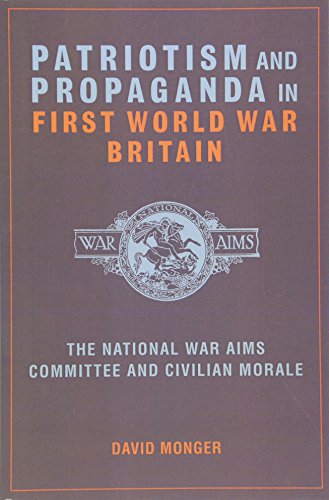
Patriotism and Propaganda in First World War Britain
by David Monger
"The National War Aims Committee and Civilian Morale"
Popularity
0 / 5
* A book's popularity is determined by how it compares to all other books on this website.
Where to buy?
Buy from Amazon* If you buy this book through the link above, we may receive a small commission at no extra cost to you.
Patriotism and Propaganda in First World War Britain by David Monger
Details
War:
World War I
Perspective:
Civilian
True Story:
Yes
Biography:
No
Region:
Europe
Published Date:
2014
ISBN13:
9781781380130
Description
Brief Summary
Patriotism and Propaganda in First World War Britain by David Monger provides a thorough examination of the National War Aims Committee (NWAC) during the First World War. The book delves into the establishment, operations, and reception of this pivotal British domestic propaganda organization. It carefully analyses the patriotic themes that permeated the NWAC's campaigns, offering a detailed exploration of the methods and messages used to bolster public morale and support for the war effort.
Main Themes and Topics
The central theme of the book is the role of propaganda in shaping public opinion during wartime. Monger provides an in-depth analysis of how the NWAC was instrumental in disseminating pro-war messages, focusing on themes of patriotism and duty. The book explores the strategies employed by the NWAC, including speeches, pamphlets, and other media, to influence the British public's perception of the war. Additionally, Monger addresses the tension between propaganda and genuine patriotic sentiment, examining how government-led initiatives aimed to cultivate a sense of national unity and purpose.
Writing Style and Tone
David Monger's writing style in Patriotism and Propaganda in First World War Britain is scholarly yet accessible, making complex historical analysis digestible for a broad audience. His tone is objective and analytical, providing a comprehensive overview of the subject matter without sacrificing clarity. Monger meticulously presents his research, using a wealth of primary sources to back up his arguments, which lends authority to his narrative.
Criticism
While the book is widely praised for its depth of research and insightful analysis, some critics note that it might be too focused on the NWAC, thereby limiting broader exploration of other contemporary propaganda efforts. However, this focus also allows for a detailed exploration of a specific and significant aspect of World War I propaganda, which many scholars and historians appreciate.









